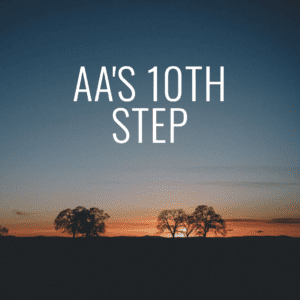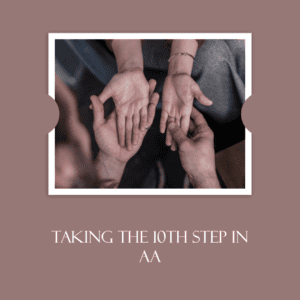 The AA 10th Step, is “Continue to take personal inventory and when we were wrong promptly admitted it.” The AA 10th Step is a cornerstone of Alcoholics Anonymous’ sobriety and personal growth program. It underscores the importance of continuous self-reflection and accountability. By addressing emotional disturbances promptly and releasing negative emotions, individuals can maintain their path to recovery.
The AA 10th Step, is “Continue to take personal inventory and when we were wrong promptly admitted it.” The AA 10th Step is a cornerstone of Alcoholics Anonymous’ sobriety and personal growth program. It underscores the importance of continuous self-reflection and accountability. By addressing emotional disturbances promptly and releasing negative emotions, individuals can maintain their path to recovery.
Understanding the AA 10th Step
The 10th Step in Alcoholics Anonymous is pivotal for long-term sobriety and personal development. It’s not just about avoiding relapse but about embracing personal growth and taking ownership of one’s life.
Key Components:
- Self-reflection: Regularly examining one’s actions, feelings, and motives helps identify and address negative patterns.
- Responsibility: Promptly admitting wrongs and making amends fosters honesty and accountability.
- Emotional Management: Addressing emotional disturbances like resentment, fear, and selfishness promotes emotional well-being.
- Relationship Building: Setting healthy boundaries and practicing forgiveness strengthens interpersonal relationships.
Benefits of the AA 10th Step:
- Personal Growth: Continuous introspection allows for the identification of areas for improvement.
- Emotional Stability: Addressing emotional disturbances promptly leads to a balanced emotional state.
- Strengthened Relationships: By setting boundaries and making amends, trust is rebuilt, and relationships are fortified.
- Relapse Prevention: Regular self-evaluation keeps individuals vigilant, reducing the risk of relapse.
Daily Inventory Questions:
- Have I been honest today?
- Did I act with kindness and compassion?
- Did I admit and correct my mistakes?
- Did I let go of resentments?
- Have I practiced forgiveness?
- Did I uphold my values and principles?
- Did I prioritize self-care and reflection?
By consistently reflecting on these questions, individuals can address negative behaviors and foster positive change. You might also want to check out AA Promises article for more values to live by.
 Maintaining Healthy Boundaries and Relationships
Maintaining Healthy Boundaries and Relationships
The 10th Step of Alcoholics Anonymous underscores the significance of cultivating and preserving healthy boundaries in relationships, which is foundational for personal well-being and recovery. Let’s delve deeper into this:
1. Recognizing Personal Needs and Limitations:
- Self-awareness: Before setting boundaries, one must be aware of their own needs, desires, and limits. This involves understanding what makes one feel comfortable and what doesn’t, recognizing the emotional and physical space they need, and discerning their strengths and weaknesses.
- Communication: Clearly articulating one’s needs is essential. It’s not about making demands but expressing feelings and requirements in a way that others can understand and respect.
2. The Role of Mistakes:
- Learning Opportunities: Every mistake provides an opportunity to learn. Instead of dwelling on the error, it’s more productive to understand why it happened, how it affected oneself and others, and how to prevent it in the future.
- Building Resilience: Accepting that everyone makes mistakes helps in building resilience. It’s not the mistake itself but how one responds to it that defines their character and growth.
3. Practicing Forgiveness:
- Self-forgiveness: Before forgiving others, one must learn to forgive oneself. Holding onto guilt or regret is counterproductive. Recognizing that everyone is human and makes mistakes can pave the way for self-forgiveness.
- Forgiving Others: Holding onto grudges or resentments can be emotionally draining. Forgiving doesn’t mean forgetting or condoning the behavior, but it’s about letting go of the burden for one’s own peace of mind.
4. Rebuilding Trust:
- Consistency: Trust is rebuilt over time through consistent behavior. Making amends, keeping promises, and demonstrating reliability are steps in the right direction.
- Open Communication: Being transparent about one’s feelings, intentions, and actions helps in rebuilding trust. It’s essential to create a safe space where both parties can express themselves without judgment.
5. The Outcome – Healthier Relationships:
- Mutual Respect: When boundaries are set and respected, it fosters mutual respect in relationships. Both parties understand and value each other’s needs and limitations.
- Deeper Connections: With trust rebuilt and open communication channels, relationships can deepen. There’s a better understanding, and connections become more authentic and meaningful.
Embracing Continual Growth with the AA 10th Step
 The AA 10th Step is a beacon for those on the journey of recovery, emphasizing the importance of accepting the present, continually self-evaluating, and striving for progress. This step is not just about maintaining sobriety but about holistic personal development. Let’s explore this further:
The AA 10th Step is a beacon for those on the journey of recovery, emphasizing the importance of accepting the present, continually self-evaluating, and striving for progress. This step is not just about maintaining sobriety but about holistic personal development. Let’s explore this further:
1. Accepting the Present:
- Living in the Moment: The AA 10th Step encourages individuals to be present, acknowledging current feelings, thoughts, and circumstances without judgment. This mindfulness can reduce anxiety and provide clarity.
- Releasing the Past: Holding onto past mistakes or regrets can hinder growth. The AA 10th Step promotes the idea of letting go, focusing on the now, and preparing for the future.
2. Continual Self-evaluation:
- Daily Inventory: A core aspect of the AA 10th Step is the practice of daily self-assessment. Reflecting on one’s actions, feelings, and motives each day ensures that individuals remain aligned with their recovery goals.
- Acknowledging Shortcomings: Recognizing areas of improvement isn’t a sign of weakness but of growth. By being honest about their shortcomings, individuals can take proactive steps towards betterment.
3. Striving for Progress:
- Setting Goals: The AA 10th Step encourages setting both short-term and long-term goals. These goals act as milestones, providing direction and purpose in the recovery journey.
- Celebrating Small Wins: Every step forward, no matter how small, is a victory. Celebrating these moments can boost morale and motivation.
4. Building a Fulfilling Life:
- Holistic Growth: Beyond sobriety, the AA 10th Step emphasizes personal development in all areas of life, be it relationships, career, or personal passions.
- Community and Support: Engaging with the AA community provides a support system. Sharing experiences, challenges, and successes with others can be therapeutic and inspiring.
5. The Lifelong Journey:
- Ongoing Commitment: The AA 10th Step is not a one-time task but a lifelong commitment. It’s about continuously evolving, learning, and growing.
- Resilience in Challenges: Life will present challenges, but with the principles of the AA 10th Step, individuals are better equipped to navigate them with resilience and grace.
In essence, the AA 10th Step is a transformative tool in the recovery process. It goes beyond sobriety, emphasizing the importance of continual growth and personal development. By integrating the principles of this step, individuals can chart a path towards a balanced, fulfilling life, marked by self-awareness, progress, and resilience.
Read our article about AA Slogan for more great tips to living a sober life.
Conclusion
The AA 10th Step is more than a recovery tool; it’s a guide for personal growth and relationship building. By embracing its principles, individuals can navigate life’s challenges with resilience, fostering a journey of healing and fulfillment. We highly recommend that you also read the AA Preamble from the Big Book. Did you like this article? Then you might also enjoy our article, “A Vision for You AA – Understanding Chapter 11.”
Ready for the next step?
AA 10th Step
11th Step Prayer in AA
12 Principles of AA
FAQ – AA 10th Step
- What is the 10th Step in AA? It emphasizes continuous self-reflection and promptly admitting wrongs.
- Why is it important? It promotes sobriety, personal growth, and relationship building.
- How is it practiced? Through daily self-evaluation, responsibility for actions, and making amends.
- What are its benefits? Personal growth, emotional stability, strengthened relationships, and relapse prevention.
- How does it aid in building relationships? By setting boundaries, admitting wrongs, and practicing forgiveness.
By understanding and implementing the AA 10th Step, individuals can pave a path towards a balanced, fulfilling life.
Liberty Addiction Recovery Center:
Embracing the 12-Step Program for Comprehensive Recovery
Liberty Addiction Recovery Center, located amidst the serene foothills of the Wasatch Mountains in Utah, stands as a beacon of hope for individuals battling alcohol and drug dependencies. With a firm belief that everyone deserves a second chance at life, the center offers a sanctuary of support, compassion, and professional expertise.
Holistic Approach to Recovery Liberty’s approach to addiction recovery is holistic, addressing not just the physical dependencies but also the psychological, emotional, and social facets of addiction. The center employs a variety of treatment modalities, ensuring a multifaceted approach to recovery. This includes evidence-based treatments like Cognitive Behavior Therapy, which has been proven to yield positive outcomes for clients.
Integration of the 12-Step Program Central to Liberty Addiction Recovery Center’s approach is the integration of 12-step programs, like the AA 10th Step, into their recovery regimen. The 12-step program, with its emphasis on personal responsibility, self-examination, and making amends, complements Liberty’s holistic approach. By incorporating these steps, the center ensures that individuals not only overcome their addiction but also grow personally, understanding and rectifying the underlying issues that led to their addiction.
Facilities and Continuity of Care Liberty boasts spacious and comfortable residential homes, designed thoughtfully to provide a conducive environment for recovery. Recognizing that recovery is a long-term process, Liberty offers a continuum of care. After the intensive phase of residential treatment, clients can transition to supportive out-patient therapy and sober living facilities. This continuity ensures that individuals have the support they need at every stage of their recovery journey.
Empowerment Through Education and Employment Liberty goes beyond just recovery. They help clients envision a life free of addiction and set clear goals for the future. Through Liberty Employment Connections, clients are connected with upskilling and educational opportunities, ensuring they are equipped to reintegrate into society and pursue their career aspirations.
Reach Out to Us Call Liberty Addiction Recovery Center if you or your loved one needs addiction treatment. Our staff of licensed professionals are passionate and dedicated to helping you with your unique situation. Give us a call and leave addiction behind!
Sources:
https://www.aa.org/
https://en.wikipedia.org/wiki/Alcoholics_Anonymous[/vc_column_text]


 Maintaining Healthy Boundaries and Relationships
Maintaining Healthy Boundaries and Relationships




